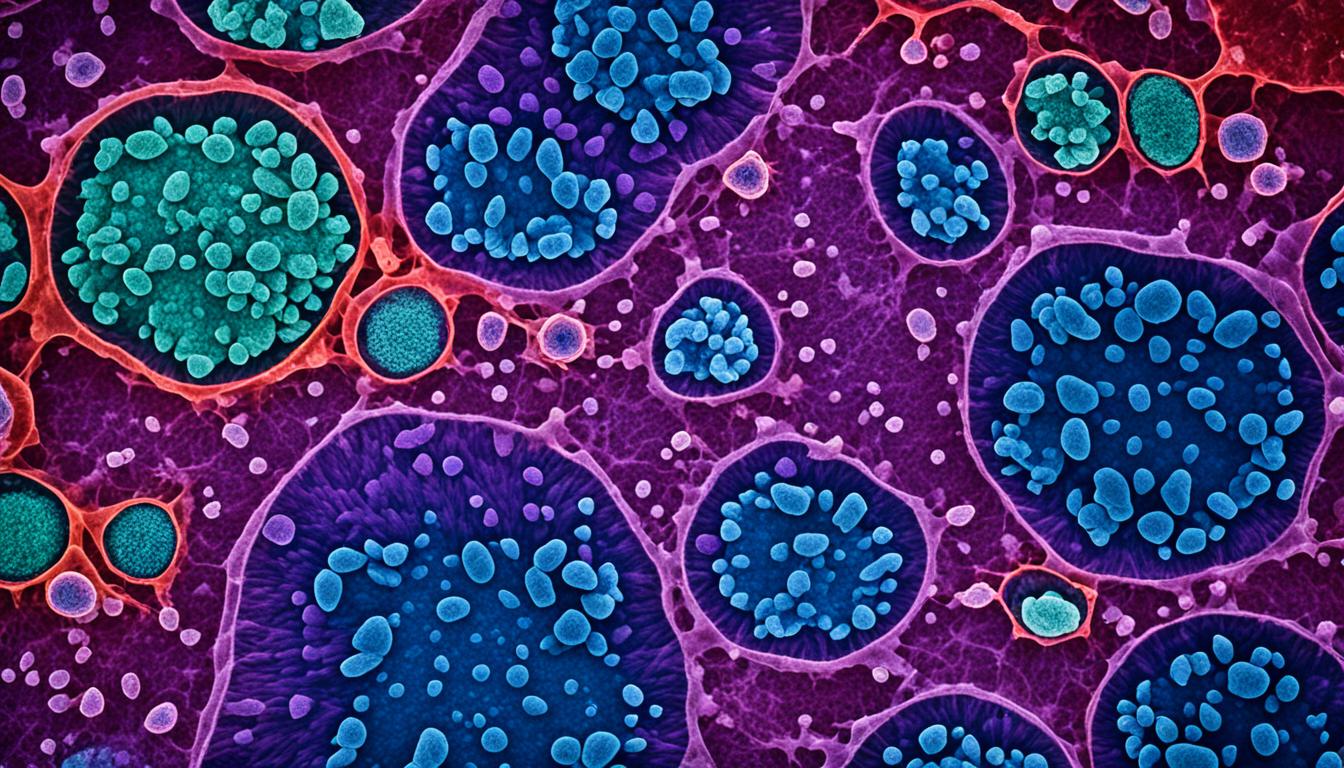When diagnosed with Merkel cell carcinoma (MCC), many individuals wonder about their life expectancy and survival rate. Understanding these factors can provide valuable insights and help individuals make informed decisions about their treatment and care. While survival rates cannot predict an individual’s specific outcome, they offer a general understanding of treatment success.
The 5-year relative survival rates based on the SEER database are as follows: 75% for localized MCC, 61% for regional MCC, 24% for distant MCC, and 65% for all stages combined. These rates are estimates and do not account for individual factors like age, overall health, and treatment response.
It’s important to comprehend that the survival rates are just one aspect of MCC prognosis. Various factors, such as the stage of cancer at diagnosis, the presence of metastasis, and overall health, can significantly impact a person’s prognosis and life expectancy. Early detection plays a pivotal role in improving survival rates, and regular monitoring is necessary to identify any potential recurrence and ensure timely intervention.
Advancements in treatment options, like surgery, radiation therapy, and immunotherapy, have contributed to better outcomes for individuals with MCC. Age and overall health status also influence prognosis and treatment outcomes. Understanding individual factors and seeking multidisciplinary care can help optimize treatment decisions, enhance survival rates, and support the overall well-being of individuals with Merkel cell carcinoma.
Factors Affecting Survival Rates of Merkel Cell Carcinoma
While survival rates provide a general understanding of Merkel Cell Carcinoma (MCC) outcomes, it’s crucial to consider the various factors that can influence a person’s prognosis. These factors include:
- The stage of the cancer at diagnosis
- The presence of metastasis
- The response to treatment
- The overall health of the individual
Early detection of MCC plays a critical role in improving survival rates and overall prognosis. Identifying the cancer in its early stages allows for prompt treatment and management, increasing the chances of successful outcomes.
Additionally, it’s important to consider the recurrence rate after treatment when assessing long-term survival prospects. Regular follow-up appointments and ongoing surveillance are essential to monitor for potential recurrence and provide early intervention if needed.
The Impact of Cancer Stage
The stage of MCC at diagnosis significantly affects survival rates. The SEER database categorizes MCC into localized, regional, and distant stages based on the extent of cancer spread.
| Stage | Definition | Survival Rate |
|---|---|---|
| Localized | Cancer has not spread beyond the site of origin | Higher survival rate compared to regional and distant cases |
| Regional | Spread to nearby structures or lymph nodes | Lower survival rate compared to localized MCC |
| Distant | Spread to distant parts of the body | Lower survival rate compared to localized and regional MCC |
Understanding the stage of MCC helps in predicting outcomes and determining suitable treatment plans.

Early detection, accurate staging, and timely intervention contribute to better outcomes and increased life expectancy for individuals with Merkel Cell Carcinoma.
The Role of Staging in Merkel Cell Carcinoma Survival
Staging plays a significant role in determining the prognosis and survival rates of Merkel cell carcinoma. The SEER database categorizes MCC into localized, regional, and distant stages based on the extent of cancer spread.
Localized MCC refers to cancer that has not spread beyond the site of origin, while regional MCC indicates spread to nearby structures or lymph nodes. Distant MCC implies cancer has spread to distant parts of the body.
Survival rates vary significantly based on the stage at diagnosis, with localized MCC having a higher survival rate compared to regional and distant cases.
The Impact of Staging on Survival Rates
To better understand the impact of staging on survival rates, let’s take a look at the data from the SEER database:
| Stage | Survival Rate |
|---|---|
| Localized MCC | Higher survival rate |
| Regional MCC | Lower survival rate |
| Distant MCC | Lowest survival rate |
As the table illustrates, the survival rate decreases as the stage of MCC progresses from localized to regional and distant cases.
Understanding the stage of the cancer at diagnosis is crucial for determining the treatment approach and providing patients with appropriate recommendations to optimize their chances of survival.
Early detection and prompt intervention are key in improving the prognosis and increasing the life expectancy of individuals with Merkel cell carcinoma.

By identifying the stage of MCC, healthcare professionals can assess the extent of cancer spread, tailor treatment plans accordingly, and provide patients with the best possible care to optimize their chances of survival.
Improvements in Treatment Options for Merkel Cell Carcinoma
Advancements in treatment options for Merkel cell carcinoma (MCC) have significantly improved outcomes and increased life expectancy for individuals with this aggressive skin cancer. Surgery, radiation therapy, and immunotherapy are the standard treatment approaches used to combat MCC.
Surgical removal of the tumor is typically the primary treatment modality for MCC. It involves removing the cancerous growth and any nearby lymph nodes that may be affected. Surgery can help eliminate the tumor and reduce the risk of recurrence.
Radiation therapy may be used in combination with surgery or as the primary treatment for MCC. It involves using high-energy X-rays or other forms of radiation to kill cancer cells and shrink tumors. Radiation therapy is often utilized after surgery to target any remaining cancer cells that may not have been completely removed.
Immunotherapy has shown promising results in the treatment of advanced or metastatic MCC. It works by stimulating the body’s immune system to recognize and destroy cancer cells. Immune checkpoint inhibitors, a type of immunotherapy, have been particularly effective in boosting the immune response against MCC cells.
These treatment options have revolutionized the management of MCC and have contributed to better overall survival rates. However, the best treatment approach for each individual may vary depending on factors such as the stage of the cancer, the presence of metastasis, and the patient’s overall health.
Treatment Options for Merkel Cell Carcinoma
| Treatment Option | Description |
|---|---|
| Surgery | Surgical removal of the tumor and nearby lymph nodes to eliminate cancer cells and reduce the risk of recurrence. |
| Radiation Therapy | Using high-energy X-rays or other forms of radiation to kill cancer cells and shrink tumors. Often used after surgery to target remaining cancer cells. |
| Immunotherapy | Stimulating the immune system to recognize and destroy cancer cells. Immune checkpoint inhibitors have shown promising results in MCC treatment. |
Combining these treatment options and customizing them based on individual patient characteristics can help optimize outcomes for those diagnosed with Merkel cell carcinoma. Medical professionals will consider the stage of the cancer, the presence of metastasis, and the patient’s overall health when determining the most suitable treatment plan.
Understanding the Role of Recurrence in Merkel Cell Carcinoma
Recurrence, or the return of cancer after treatment, is an important factor to consider when assessing long-term survival in Merkel cell carcinoma. While recurrence rates can vary, the risk of recurrence tends to be higher in cases of regional or distant MCC.
Regular follow-up appointments and ongoing surveillance are essential to monitor for potential recurrence and to provide early intervention if needed. Close monitoring and timely intervention can contribute to improved outcomes and prolonged survival for individuals with MCC.
Factors Influencing Recurrence Rate
The recurrence rate of Merkel cell carcinoma can be influenced by several factors, including:
- Tumor stage at diagnosis
- Size and depth of the tumor
- Involvement of lymph nodes
- Presence of metastasis
- Response to treatment
Individuals with regional or distant MCC are at a higher risk of recurrence due to the potential for cancer cells to have spread beyond the primary site. Patients with localized MCC, where the cancer is confined to the original site, have a lower risk of recurrence. It’s essential to consider these factors when evaluating the long-term prognosis and survival prospects of individuals with MCC.
Monitoring and Early Intervention
Regular monitoring, including physical exams and imaging tests, is crucial for detecting recurrence in Merkel cell carcinoma. These follow-up appointments allow healthcare professionals to evaluate the individual’s response to treatment and identify any signs of cancer recurrence.
In cases of suspected recurrence, further diagnostic tests such as biopsies or imaging studies may be performed to confirm the presence of cancer. Early intervention upon recurrence can involve additional treatment modalities, including surgery, radiation therapy, or immunotherapy, depending on the specific circumstances of the individual.

Factors Influencing Recurrence Rate in Merkel Cell Carcinoma
| Factors | Influence on Recurrence Rate |
|---|---|
| Tumor Stage | Higher risk in regional or distant MCC |
| Tumor Size and Depth | Increased risk with larger and deeper tumors |
| Lymph Node Involvement | Greater risk if cancer has spread to lymph nodes |
| Presence of Metastasis | Elevated risk in cases of distant MCC |
| Response to Treatment | Effectiveness of treatment may impact recurrence rate |
Regular monitoring, timely intervention, and ongoing collaboration between healthcare professionals and patients are crucial in managing recurrence and optimizing outcomes for individuals with Merkel cell carcinoma.
The Significance of Early Detection in Merkel Cell Carcinoma
Early detection of Merkel cell carcinoma is crucial for improving prognosis and increasing life expectancy. Routine skin examinations and self-checks can aid in the early identification of suspicious lesions or growths.
Early detection allows for prompt evaluation and biopsy of any concerning skin abnormalities, which can lead to early diagnosis and initiation of appropriate treatment.
Heightened awareness and education about the signs and symptoms of MCC can facilitate early detection, contributing to better outcomes for individuals affected by this aggressive skin cancer.

Regular screening and early intervention play a crucial role in managing Merkel cell carcinoma. By detecting the cancer at an early stage, treatment options can be explored more effectively, potentially leading to better outcomes and increased chances of survival.
Individual Factors Affecting Merkel Cell Carcinoma Prognosis
While cancer-related factors play a significant role in determining the prognosis of Merkel cell carcinoma, individual characteristics should not be overlooked. The age at diagnosis and overall health status of the patient are important considerations that can influence life expectancy and treatment outcomes for individuals with MCC.
Age is a crucial factor to assess when evaluating prognosis in Merkel cell carcinoma. Older individuals may have different treatment responses and may face unique challenges in managing their condition. As age increases, the body’s ability to fight off cancer and recover from treatment may be compromised. Additionally, older individuals may have a higher likelihood of having underlying medical conditions that can impact treatment outcomes.
Overall health status is another crucial aspect to consider when assessing prognosis. Individuals with pre-existing health conditions may face additional challenges when managing MCC. The presence of comorbidities may impact treatment options and limit the body’s ability to tolerate certain therapies. It’s essential for healthcare providers to take into account an individual’s overall health when developing a treatment plan.
It is important to note that every individual is unique, and the impact of age and overall health on MCC prognosis may vary. Multidisciplinary care and personalized treatment plans can optimize treatment decisions and support the overall well-being of individuals with MCC.
Treatment Options Based on Individual Factors
The treatment approach for Merkel cell carcinoma may vary depending on an individual’s age and overall health status. Healthcare providers consider these factors when developing treatment plans to ensure the best possible outcomes. Below is an overview of potential treatment options based on individual characteristics:
| Age Group | Overall Health Status | Treatment Options |
|---|---|---|
| Younger adults | Good overall health | Surgical removal of the tumor, radiation therapy, immunotherapy |
| Elderly individuals | Frailty or underlying health conditions | Less aggressive surgical approaches, radiation therapy with caution, immunotherapy with careful monitoring |
| Individuals with comorbidities | Presence of pre-existing health conditions | Individualized treatment plans considering underlying health conditions and potential drug interactions |
| All age groups | Compromised overall health | Palliative care, symptom management, and supportive therapies |
Impact on Treatment Response and Prognosis
The age and overall health of an individual can impact their response to different treatment modalities and the overall prognosis in MCC. Younger individuals with good overall health may experience better treatment responses due to their robust immune system and better tolerance to treatment side effects. On the other hand, elderly individuals or those with underlying health conditions may have a reduced ability to recover from treatment-related complications, which can impact their overall prognosis.
It’s crucial for healthcare providers to carefully consider individual factors when developing treatment plans for MCC. This personalized approach can help optimize treatment decisions, minimize treatment-related complications, and support patients in achieving the best possible outcomes.
Please note that the table and information provided above are for illustrative purposes only and should not replace professional medical advice. It’s important for individuals with Merkel cell carcinoma to consult with their healthcare provider to determine the most appropriate treatment approach based on their individual characteristics and circumstances.
Conclusion
Understanding the prognosis and life expectancy for individuals with Merkel cell carcinoma (MCC) requires considering various factors. It’s important to remember that survival rates and general information about MCC outcomes do not predict individual outcomes. Factors such as the cancer stage, metastasis, treatment response, age, and overall health can significantly impact the prognosis for each person.
Advances in treatment options have contributed to improved outcomes for individuals with MCC. Surgical removal of the tumor, radiation therapy, and immunotherapy are among the treatment modalities that have shown promising results. Early detection plays a crucial role in improving prognosis and increasing life expectancy. Regular self-checks, routine skin examinations, and prompt evaluation of suspicious lesions are essential for early diagnosis and timely treatment.
Monitoring for potential recurrence and ensuring ongoing surveillance are vital for managing MCC in the long term. Regular follow-up appointments can help detect and address any recurrence or new developments promptly. Together, early detection, effective treatment options, and close monitoring can support the best possible outcomes for individuals affected by Merkel cell carcinoma.




